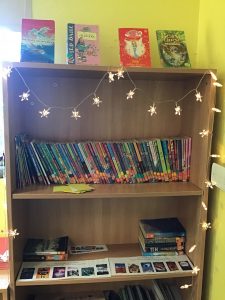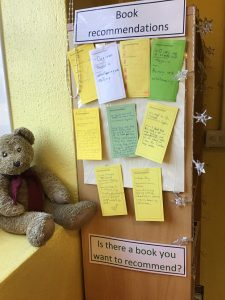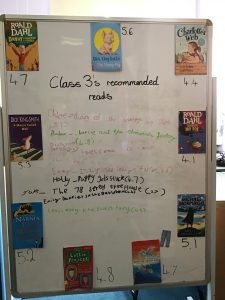Reading

How Reading is Taught
We put the teaching of reading at the heart of our school and ensure the staff have the knowledge and determination to teach every child, regardless of age, background or need.
From entry into the school, children are taught early reading skills through a systematic synthetic phonic programme. Very quickly they begin to recognise letters, the sounds they make and to blend individual and groups of letters to form words. At the same time they are taught to makes sense of what they have read and infer meaning. As reading skills become established and children become increasingly fluent, they are able to choose from a wider range of reading material. They can also test their understanding of books read, through online comprehension quizzes.
“Reading is important. If you know how to read, then the whole world opens up to you.” Barack Obama
Systematic Synthetic Phonics
At Harrowbarrow, we use the Read Write Inc programme of teaching phonics. This systematic synthetic programme provides a consistent approach from the moment children start at school, through to the end of Year 2. By this stage, most children will have secured all the skills necessary to decode new words, to read regular undecodable words and to read with a high level of fluency. A small minority of children will start Year 3 requiring further teaching in this area. For those, we provide additional Read Write Inc tuition such as the Fresh Start programme to ensure they secure these key skills at the earliest opportunity.
At every stage of the Read Write Inc programme children are fully immersed in the sounds being taught as they are exposed to them in the books they read and in their writing lessons too.
“Reading is still the main way that I both learn new things and test my understanding.” Bill Gates
Accelerated Reader
Once early reading skills have been secured, children progress on to the Accelerated Reader programme, usually towards the end of Year 2 or the start of Year 3. We have a vast range of reading material which has been banded, based on the complexity of the vocabulary and the sophistication of the text. Children complete half termly Star Assessments to determine the band of book most suited to their level of ability. Once they have read a book, children can take an online quiz to assess their understanding of it. Children from Year 3 to Year 6 have a daily half hour Accelerated Reader time, when they can fully enjoy reading and quizzing.
For further information: Parent’s Guide to Accelerated Reader
“There is more treasure in books than in all the pirate’s loot on Treasure Island.” Walt Disney
Literacy Lessons
Children will have the opportunity to read and interrogate texts as part of the daily literacy lesson. Often, explicit links are made between the text they are following and the writing element of the lesson. For example, in Years 3 to 6 children will identify features of writing in a text, such as the use of subordinating clauses, before attempting to write their own.
“As head of a global company, everything attracts me as a reader, books about different cultures, countries, problems. I read for pleasure and to find other perspectives on how to think or solve a problem.” Shelly Lazarus
Cross-curricular Reading
Reading does not stand alone as a curriculum subject, but permeates across all areas of the curriculum. Children will read subject related texts or extracts as part of their lessons in science, history, geography etc. So, securing reading skills is integral to children’s progress in all areas of the curriculum.
“My best friend is a person who will give me a book I have not read.” Abraham Lincoln
Reading for Pleasure
The development of children’s reading skills and comprehension is intertwined with the need to nurture a love of books and reading to create lifelong readers. To achieve a love of books, children need to be exposed to high quality literature that grabs their attention, sparks their intrigue and develops a thirst for more. Good books have the ability to transport children to new worlds or connect them with experiences similar to their own. They can broaden children’s knowledge of the world, grow their vocabulary and provide a safe haven to escape to.
Reading for pleasure is promoted continually in the following ways:
- Children are read to daily, from books identified for their quality.
- A reading spine of high quality books is promoted for each age group.
- Dedicated reading areas in each classroom promote high quality books alongside calming places to enjoy a good read.
- During the summer months, all children have access to the school’s reading yurt at breaktimes, where they can be read to by Year 6 Learning Ambassadors or enjoy reading to themselves.
- Children can recommend good reads to their peers, to promote interest.
Occasionally, we are also able to promote reading for pleasure in these ways:
- Author visits to talk about their work and read to the children.
- Visits to the local library; last time we ensured every child was registered for a library book.





Reception recommended reads
Year 1 recommended reads
Year 2 recommended reads
Year 3 recommended reads
Year 4 recommended reads
Year 5 recommended reads
Year 6 recommended reads
Poetry
If you like poems, why not visit the Children’s Poetry Archive.
You will find hundreds of poems from famous poets; many being read by the poet.
